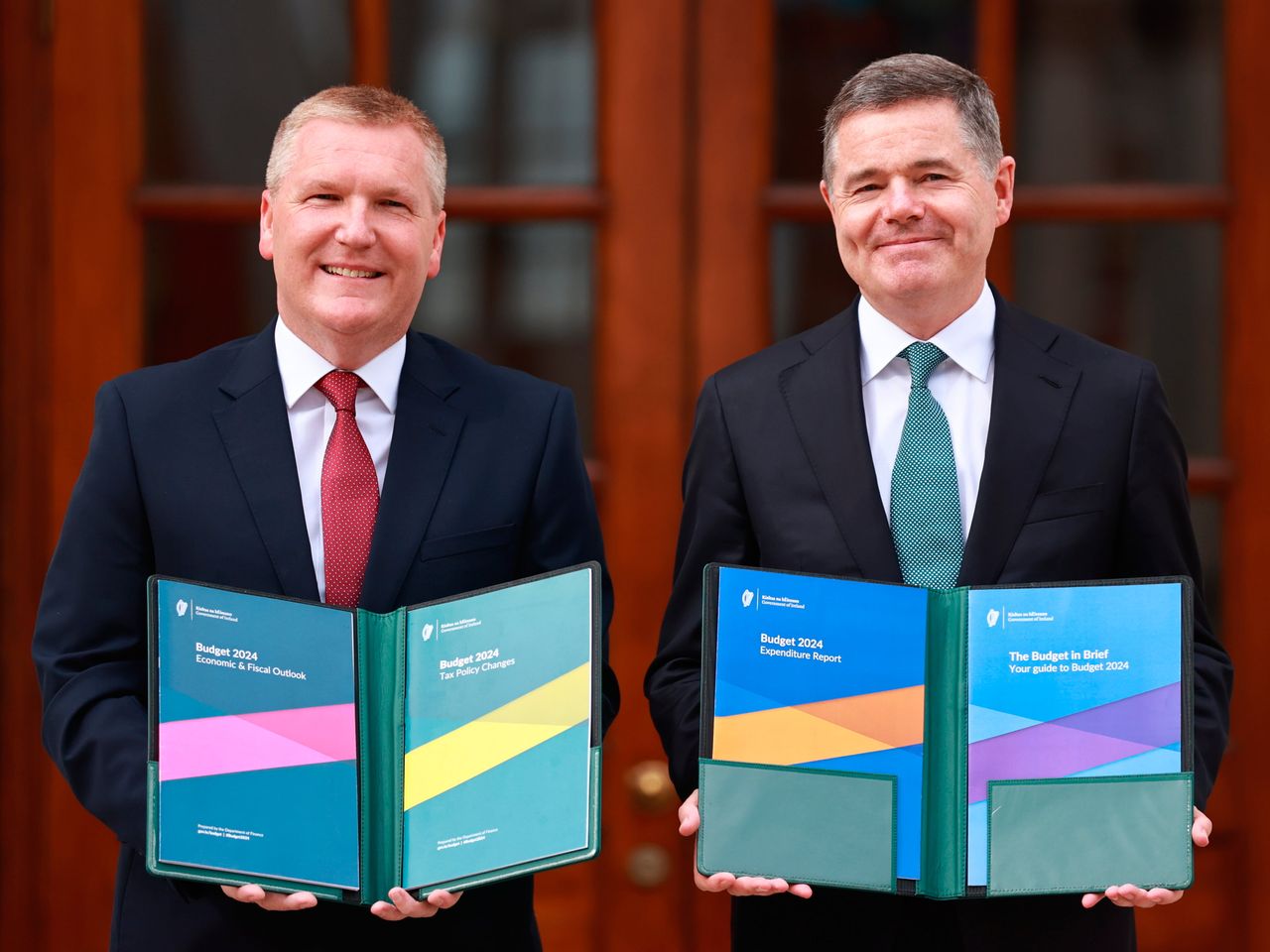Introduction:
On Ireland Budget Day 2024, Minister for Finance Michael McGrath and Minister for Public Expenditure Paschal Donohoe unveiled a multibillion-euro package of spending increases, once-off payments, and tax cuts that will shape Ireland’s fiscal landscape for the year ahead. This article provides a detailed breakdown of the main points from Ireland’s Budget for 2024.
https://usanewsdiaries.com/?p=845(opens in a new tab)
Ireland Budget 2024 : Total Spending Package:
Michael McGrath announced a total spending package of €14 billion, comprising core spending and tax increases of €6.4 billion, once-off measures of €2.7 billion, and noncore expenditure of €4.75 billion.
Tax Cuts:
Ireland budget 2024 offers a personal tax package worth €1.3 billion was unveiled, which translates to approximately €800 for individual workers. Key highlights include:
Personal, PAYE, and earned income tax credits increasing by €100 to €1,875.
The Standard Rate Band, the threshold for higher income tax, rising by €2,000 to €42,000.
Lower 2 percent Universal Social Charge (USC) ceiling increasing by €2,840, applying to earnings up to €25,760.
Reduction of the higher rate of USC applied to earnings above that level up to €70,044 by 0.5 percent to 4 percent.
Increased tax credits for home carers, single person child carers, and incapacitated child tax credits.
Extension of the USC concession for medical card holders earning less than €60,000 per year until the end of 2025.
Welfare Recipients and Pensioners:
In Ireland budget 2024 Weekly welfare and pension payments will see a permanent increase of €12, complemented by Christmas and January Bonus payments, along with several lump sum payments for various allowances.
Families and Children:
A 25 percent reduction in childcare costs is promised for September 2024.
A double child benefit payment of €280 per child will be paid before Christmas.
Child benefit will be extended to parents of 18-year-olds in full-time education.
Free schoolbooks will be introduced at the junior cycle in secondary school.
College fees for undergraduates from families with incomes under €100,000 will be halved, and all other families will see undergraduate full-time student fees reduced by €1,000.
Foster children will benefit from improved inheritance rights.
Price of a Pint, Cigarettes, and Vaping:
No increase in the cost of a pint or bottle of wine.
A 75c increase in the price of a packet of cigarettes.
A domestic tax on e-cigarettes and vaping products is planned for the next year’s budget.
Ireland Budget 2024 : Mortgage Holders
A €125 million once-off measure will support homeowners facing increased payments due to interest rate hikes. Eligibility criteria include a principal private residence, an outstanding mortgage balance between €80,000 and €500,000 on December 31st, 2022.
Housing, Landlords, and Renters:
Rental tax credit increases from €500 to €750.
Parents paying for student children in full-time accommodation can claim the credit, retroactively for 2022 and 2023.
Landlords benefit from a tax break that gradually increases up to 2027.
The vacant property tax rate will increase.
The Help-to-Buy scheme is extended and reformed.
Residential Zoned Land Tax liability date is extended.
Energy Credits:
Three energy credits of €150 each will be paid to households. The lower nine percent VAT rate on energy products is extended, and the planned fuel excise charge increase is deferred.
Businesses, Workers, and Farmers:
A €250 million package aids small and medium firms, offering a grant worth up to 50 percent of rates.
Angel investors benefit from a reduced rate of Capital Gains Tax.
The minimum wage increases to €12.70.
The banking sector faces an increased levy.
R&D tax credit increases to 30 percent.
Higher investment relief for the Employment Investment Incentive Scheme.
Retirement relief age limits extended.
Several tax credits and incentives for various sectors, including film and agriculture.
Health:
While tackling a projected overspend of over €1 billion in the health budget, the focus is on addressing inflation and patient demand, with limited room for new measures.
Public Transport:
The 20 percent cut in public transport fares for adults is extended.
Half-price fares on public transport now include 24- and 25-year-olds.
Climate and Long-Term Investment:
The Future Ireland Fund, funded by contributions and seed funding, aims to reach €100 billion by the mid-2030s.
The Infrastructure, Climate, and Nature Fund will receive €14 billion by 2030.
Tax incentives for residual electricity sales, VAT exemption for solar panels, and deferred fuel excise charges support renewable energy.
Policing and Justice:
Funding for Garda trainees, overtime, Garda reserve recruitment, tackling Domestic, Sexual and Gender Based Violence, and legal aid fee increases.
Motoring:
Benefits-in-kind market value relief for electric company vehicles.
VRT relief for battery electric vehicles extended.
These key points provide a comprehensive overview of Ireland’s Budget for 2024, outlining how it impacts various sectors of the economy and society. Please note that this information is based on the provided details and may be subject to changes and updates.

